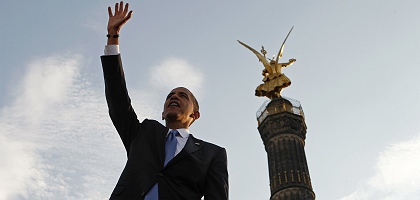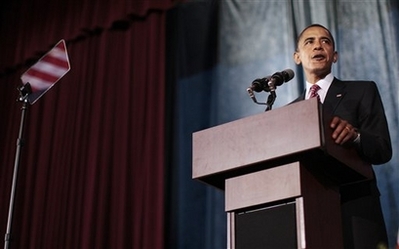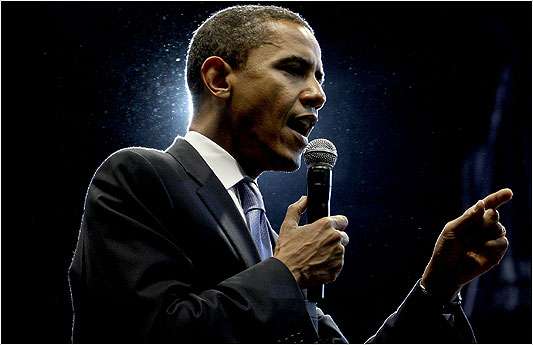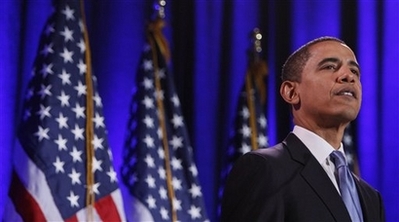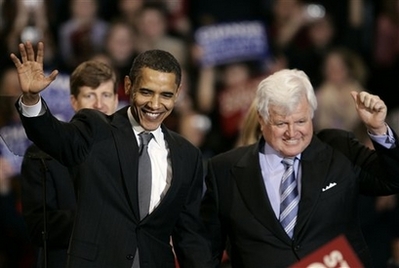|
I feel change in the air.
Every time I’ve been asked over the past year who I would support in the Democratic Primary, my answer has always been the same: I’ll support the candidate who inspires me, who inspires all of us, who can lift our vision and summon our hopes and renew our belief that our country’s best days are still to come.
I’ve found that candidate. And it looks to me like you have too…
I believe there is one candidate who has extraordinary gifts of leadership and character, matched to the extraordinary demands of this moment in history.
He understands what Dr. Martin Luther King, Jr. called the “fierce urgency of now.”
He will be a president who refuses to be trapped in the patterns of the past. He is a leader who sees the world clearly without being cynical. He is a fighter who cares passionately about the causes he believes in, without demonizing those who hold a different view.
He is tough-minded, but he also has an uncommon capacity to appeal to ‘the better angels of our nature.’
I am proud to stand here today and offer my help, my voice, my energy and my commitment to make Barack Obama the next President of the United States…
We know the true record of Barack Obama. There is the courage he showed when so many others were silent or simply went along. From the beginning, he opposed the war in Iraq.
And let no one deny that truth.
There is the great intelligence of someone who could have had a glittering career in corporate law, but chose instead to serve his community and then enter public life.
There is the tireless skill of a Senator who was there in the early mornings to help us hammer out a needed compromise on immigration reform — who always saw a way to protect both national security and the dignity of people who do not have a vote. For them, he was a voice for justice.
And there is the clear effectiveness of Barack Obama in fashioning legislation to put high quality teachers in our classrooms — and in pushing and prodding the Senate to pass the most far-reaching ethics reform in its history.
Now, with Barack Obama, there is a new national leader who has given America a different kind of campaign — a campaign not just about himself, but about all of us. A campaign about the country we will become, if we can rise above the old politics that parses us into separate groups and puts us at odds with one another.
I remember another such time, in the 1960s, when I came to the Senate at the age of 30. We had a new president who inspired the nation, especially the young, to seek a new frontier. Those inspired young people marched, sat in at lunch counters, protested the war in Vietnam and served honorably in that war even when they opposed it.
They realized that when they asked what they could do for their country, they could change the world.
It was the young who led the first Earth Day and issued a clarion call to protect the environment; the young who enlisted in the cause of civil rights and equality for women; the young who joined the Peace Corps and showed the world the hopeful face of America.
At the fifth anniversary celebration of the Peace Corps, I asked one of those young Americans why they had volunteered.
And I will never forget the answer: “It was the first time someone asked me to do something for my country.”
This is another such time.
I sense the same kind of yearning today, the same kind of hunger to move on and move America forward. I see it not just in young people, but in all our people.
And in Barack Obama, I see not just the audacity, but the possibility of hope for the America that is yet to be.
What counts in our leadership is not the length of years in Washington, but the reach of our vision, the strength of our beliefs, and that rare quality of mind and spirit that can call forth the best in our country and our people.
With Barack Obama, we will turn the page on the old politics of misrepresentation and distortion.
With Barack Obama, we will close the book on the old politics of race against race, gender against gender, ethnic group against ethnic group, and straight against gay.
With Barack Obama, we will close the door on the old economics that has written off the poor and left the middle class poorer and less secure…
So let us reject the counsels of doubt and calculation.
Let us remember that when Franklin Roosevelt envisioned Social Security, he didn’t decide—no, it was too ambitious, too big a dream, too hard.
When John Kennedy thought of going to the moon, he didn’t say no, it was too far, maybe we couldn’t get there and shouldn’t even try.
I am convinced we can reach our goals only if we are ‘not petty when our cause is so great’– only if we find a way past the stale ideas and stalemate of our times – only if we replace the politics of fear with the politics of hope – and only if we have the courage to choose change.
Barack Obama is the one person running for President who can bring us that change.
Barack Obama is the one person running for President who can be that change.
I love this country. I believe in the bright light of hope and possibility. I always have, even in the darkest hours. I know what America can achieve. I’ve seen it. I’ve lived it — and with Barack Obama, we can do it again.
I know that he’s ready to be President on day one. And when he raises his hand on Inauguration Day, at that very moment, we will lift the spirits of our nation and begin to restore America’s standing in the world.
There was another time, when another young candidate was running for President and challenging America to cross a New Frontier. He faced public criticism from the preceding Democratic President, who was widely respected in the party. Harry Truman said we needed ‘someone with greater experience’ — and added: ‘May I urge you to be patient.’ And John Kennedy replied: ‘The world is changing. The old ways will not do…It is time for a new generation of leadership.’
So it is with Barack Obama. He has lit a spark of hope amid the fierce urgency of now.
I believe that a wave of change is moving across America. If we do not turn aside, if we dare to set our course for the shores of hope, we together will go beyond the divisions of the past and find our place to build the America of the future.
My friends, I ask you to join in this historic journey — to have the courage to choose change.
It is time again for a new generation of leadership.
It is time now for Barack Obama.
|
